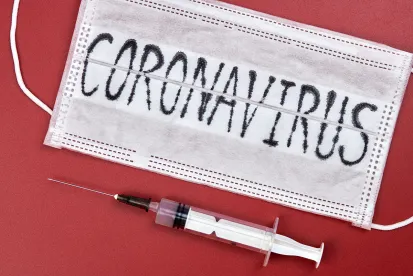The COVID-19 pandemic has challenged businesses and employers in ways that few thought possible just six months ago.
Untold millions have lost jobs, and vast numbers of businesses have been forced to close in an attempt to slow the spread of the coronavirus. COVID-19, as of September 2, 2020, according to the Centers for Disease Control and Prevention, has killed or contributed to the deaths of at least 170,000 Americans. Congress, a few months ago, threw employers a curveball in the form of the "Families First Coronavirus Response Act" (the "FFCRA") that, for the first time, created a nationwide paid-leave law. States have issued their own laws and executive orders, as has, for example, North Carolina, the most recent of which, Executive Order 163, was issued on September 1, 2020. An article about that can be found here.
All business owners must consider what they must do to protect the health and safety of their employees and customers in ways that most employers never pondered before. "CDC guidelines" have become more prominent than ever, and face masks, previously used primarily in clinical and industrial settings, have become de rigueur if not legally required.
But some people object to wearing face masks and don't want their employer or the businesses that they patronize to tell them that they have to do so when on the businesses' premises. Some of those who have objected to the requirement have done so on religious grounds. One group, for example, ironically named "The Healthy American", based in California, is selling a "RELIGIOUS EXEMPTION INFORMATION CARD" for a "donation" of $12, that "can be used in every state in the USA" (the "Religious Exemption Card"). The Religious Exemption Card, 4 x 3 inches in size and provided with a "plastic sleeve and neck lanyard", reads exactly (in substance and form) as follows:
The bearer of this card is LEGALLY EXEMPT from wearing any face coverings or being subjected to temperature taking or viral testing, as protected by U.S. Federal Law Title 2 of the Civil Rights Act, §§ 201 (a) According to state and federal civil rights law, this individual has FREE and EQUAL access to all facilities in your business establishment, regardless of store policies. Refusal of service may place you at risk of being prosecuted to the fullest extent of the law. Your recognition and protection of these religious and civil rights is appreciated.
The Religious Exemption Card purports to be signed by a "Pastoral Representative" and bears a gold seal with a cross. The seller's website claims that the "bearer of this card is exempt from wearing masks or cloth face coverings" (and for that matter from "having temperature taken, viral testing and vaccinations"); that "[y]our right to shop mask-free is protected by state and federal civil law, which defends your religious freedom"; and that the "card clearly states the applicable laws, and penalty for violating the laws." But the seller, wisely unsure of itself, cautions that "[t]his card … does not guarantee your entry into any particular business establishment."
That's good because the Religious Exemption Card does nothing of the kind.
The card refers to "Federal Law Title 2 of the Civil Rights Act", presumably meaning Title II of the Civil Rights of Act of 1964 (the "Act"), which prohibits "discrimination or segregation in [specified] places of public accommodation" based, in part, on "religion". (It also refers to unspecified "state … civil rights law". North Carolina law doesn't "exempt" customers from having to wear masks in public facilities based on "religion" (although the governor's latest Executive Order does so on numerous other grounds). The relevant laws of other states, if any, are beyond the scope of this article.)
Employers have had to deal with the threat of potential "religious discrimination" claims by applicants and employees for decades. Title VII of the Act requires employers who are covered by that title of the Act (generally speaking, those that employ 15 or more employees) to "reasonably accommodate" – in the employment context – an applicant's or employee's sincerely held religious belief, unless doing so would cause an "undue hardship on the conduct of the employer's business". Such an accommodation might take the form of letting an employee whose traditional Sabbath is on Saturday have that day off and work instead on Sunday, or waiving a dress code prohibiting employees from wearing headwear and permitting an employee who wears a turban for sincerely held religious reasons to wear it at work. Such employment-based obligations are nothing new.
But do the obligations imposed on employers by Title VII mean that customers of businesses, based on Title II, have the "right to shop mask-free" based on customers' so-called "religious freedom" or that owners of businesses who refuse service to the mask-less face the "risk of being prosecuted?" The answer, thank … goodness, is NO.
The law invoked by the Religious Exemption Card, Title II of the Act, provides in part as follows:
2000a. Prohibition against discrimination or segregation in places of public accommodation
"(a) Equal access
All persons shall be entitled to the full and equal enjoyment of the goods, services, facilities, privileges, advantages, and accommodations of any place of public accommodation, as defined in this section, without discrimination or segregation on the ground of race, color, religion, or national origin.
Notably, it applies only to defined "place[s] of public accommodation". They include, for example:
-
Inns, hotels, motels, and other establishments that provide "lodging to transient guests";
-
Restaurants, cafeterias, lunchrooms, lunch counters, soda fountains, and "other facility[ies] principally engaged in selling food for consumption on the premises"; and
-
Movie theaters, concert halls, sports arenas, stadiums and "other place[s] of exhibition or entertainment".
Customers who have suffered intentional "discrimination or segregation on the ground of … religion" in a "place of public accommodation" (for example, by the posting of a bigoted sign reading "No Sikhs allowed") can sue an offending business, but not for money-damages: they may sue only for prospective injunctive relief, and may get an award of "a reasonable attorney's fee as part of the costs" in the discretion of the court.
But can they lawfully sue a business for alleged violation of the Act, whose only offense is refusing to accommodate a customer's religious demand that he or she be allowed to "shop mask-free"? The answer, again, is NO. Title II of the Act, no matter what you may hear elsewhere, does not require "place[s] of public accommodation" to accommodate the religious beliefs of its patrons by waiving a rule that it imposes on others so long as the rule is applied to all customers without regard to their "religion" (or, for that matter, their race, color, or national origin), such as a rule prohibiting entry on the premises unless you are wearing a face mask".
This, too, is not new. As plainly put by a federal district court in Idaho 25 years ago:
In the three decades since Title II was enacted, Congress and the supervising federal agencies have never added language to Title II to extend Title VII's employee protections to customers or patrons. In the Court's view, this is persuasive evidence of a congressional intent not to require Title II public facilities to reasonably accommodate the religious beliefs of patrons.
The court noted the "complete absence of any court decision in the past thirty years applying the reasonable accommodation requirements of Title VII to Title II". That absence has continued to this day.
The bottom line for those who operate businesses that are covered by Title II of the Act and their customers: A Title II claim of "religious" discrimination cannot be asserted based only on the imposition of a rule requiring customers to wear specified attire, such as face masks, that denies service to those who refuse to wear them, unless there is reason to believe that the operator of the business, by imposing the rule, intended to discriminate against customers based on religion. Mere faith in that perception, devoid of evidence of intentional discrimination, won't cut it. Neither will reliance on a $12 "Religious Exemption Card."
Customers inclined to buy such a card would make better use of their money by spending it on a mask.




 />i
/>i

